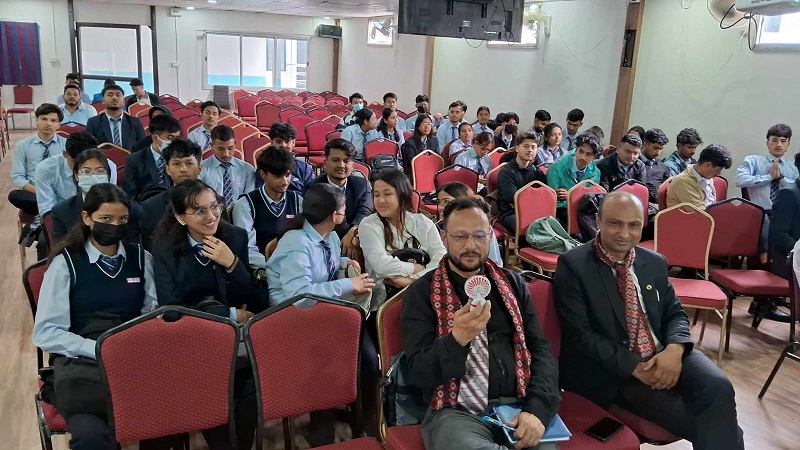Nepal Navigates Digital Governance – Cybersecurity, Partnerships, and Building a Digital Future
29th May 2024, Kathmandu
Nepal’s Digital Governance Journey: Challenges and Opportunities in Cybersecurity, Infrastructure, and Public Engagement (#npCert Workshop Report)
In celebration of National ICT Day, the Information Security Response Team Nepal (#npCert) and the Center for Cyber Security Research and Innovation (CSRI) organized a significant workshop on Digital Governance and Cybersecurity at Texas College of Management and IT.
Nepal Navigates Digital Governance
Esteemed speakers, including Professor Sudan Jha, Dr. Sameer Kharel, Dr. Shaligram Parajuli and Mr. Chiranjibi Adhikari, shared valuable insights on enhancing e-Governance and tackling cybersecurity challenges in Nepal.
The event aimed to foster discussions on improving digital infrastructure, promoting public-private partnerships, and increasing digital literacy to advance Nepal’s e-Governance framework. It highlighted Nepal’s journey toward e-Governance, beginning with the IT Policy of 2000 and further developed by the Digital Nepal Framework of 2019.
Despite advancements like the Nagarik App, the workshop noted ongoing challenges such as political instability, insufficient ICT professionals, and inadequate digital infrastructure. The discussions underscored the need for improved coordination, investment, and digital literacy to enhance service delivery and governance efficiency.
The workshop served as a crucial platform for stakeholders to collaborate on strategies for a more transparent and inclusive digital government, emphasizing the importance of continuous development and investment in Nepal’s digital future.
Speaker Professor Dr. Sudan Jha
“Advancing Digital Governance and Cybersecurity in Nepal: Strategies, Challenges, and Opportunities Explored by Professor Dr. Sudan Jha”
Professor Dr. Sudan Jha presented on Digital Governance and Cybersecurity in Nepal, emphasizing objectives such as promoting digital governance for transparency and efficiency, building capacity through training, and raising public awareness of digital services.
Digital governance aims to improve government functions and service delivery using ICT, fostering an efficient, transparent, accountable, and inclusive government. Challenges include the lack of reliable internet and electricity in rural areas and a general discomfort with technology among some citizens, alongside data security and privacy concerns.
Opportunities lie in using online platforms to streamline government services and increase transparency, and employing digital tools for citizen engagement. Strategies for improvement include developing mobile apps for essential services, utilizing local community networks, and implementing gamification for education on government services. International case studies highlighted include Estonia’s digital society and Rwanda’s innovative use of drones for healthcare delivery.
Speaker, Academic Expert Dr. Sameer Kharel
Dr. Sameer Kharel led a workshop on improving e-Governance in Nepal. The focus was on cybersecurity, public-private collaboration, and boosting digital literacy. Protecting data and public trust is key for economic stability and national security. Challenges include political instability and weak IT infrastructure. Continuous improvement and collaboration are crucial for success.
Speaker Dr. Shaligram Prajuli, General Secretary of CSRI
“Insights on Digital Governance and Cybersecurity in Nepal by Dr. Shaligram Parajuli, General Secretary of the Center for Cyber Security Research and Innovation”
He emphasized the aim of digital governance to enhance public service delivery through technology, promoting efficient, transparent, and accountable processes. Significant strides in e-governance have been made with projects like the National Information Technology Center (#NITC) and Government Integrated Data Center (#GIDC).
Despite these advancements, challenges such as cyber security threats, the digital divide, and limited infrastructure persist. Effective cyber security measures, including risk assessments, encryption, and comprehensive legislation, are crucial.
The future of digital governance in Nepal looks promising with plans to expand broadband access, develop smart city projects, and foster public-private partnerships.
Speaker, Founder President of npCert & General Secretary of CAN Federation
Digital governance in Nepal aims to improve public service delivery through ICT, enhancing transparency and efficiency. Challenges include political instability, limited ICT infrastructure, and a shortage of skilled professionals. Efforts such as the Digital Nepal Framework and the Nagarik App represent significant strides, but gaps remain in digital literacy and access.
Chiranjibi Adhikari, in a recent workshop, highlighted the critical role of cybersecurity in protecting data and maintaining public trust. Emphasizing public-private partnerships and continuous improvement, Adhikari called for better infrastructure, policy updates, and stakeholder collaboration to advance Nepal’s digital governance. Addressing these challenges is crucial for fostering a more inclusive and accountable e-Governance system.
The closing remarks were delivered by the secretary of CSRI and the Head of the Department of IT at Texas College of Management Dr. Suman Thapaliya. npCert President Chiranjibi Adhikari chaired the program.
Notable attendees included the Founder of the Tech Entrepreneurs Association of Nepal, a media entrepreneur, a chief editor, and a tech blogger. Rohit Pandey served as the program’s Master of Ceremonies.
For more Information: Nepal Navigates Digital Governance







